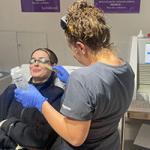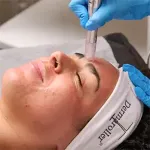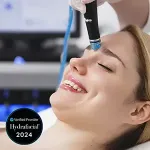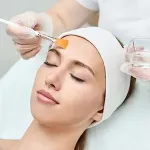If you’ve been struggling with redness, rosacea, or pigmentation, you’ll know how tricky these issues can be to manage. Skincare can help, of course, but sometimes you need an extra push - and that’s where Laser and Intense Pulsed Light (IPL) treatments come in.
These advanced, non-invasive treatments work by targeting redness and pigmentation at their source, helping to clear and brighten your complexion. They’re safe, effective, and tailored to your unique skin concerns - whether it’s from the cold weather, sunspots from skipping SPF (we’ve all done it), or stubborn broken capillaries.

How Laser & IPL Treatments Work
Both Laser and IPL treatments use light energy to treat redness and pigmentation, but they work slightly differently:
- Laser: Focuses on a single wavelength of light to target specific concerns, such as broken capillaries or concentrated pigmentation.
- IPL: Uses a broader spectrum of light, making it suitable for addressing multiple issues, including redness, pigmentation, and uneven skin texture.
The light energy is absorbed by the unwanted blood vessels or pigment in the skin. For redness, the haemoglobin in the blood vessels absorbs the light, causing them to heat up and collapse. For pigmentation, the light breaks down melanin, which is then naturally eliminated by your body. The result? A reduction in visible redness, pigmentation, and uneven tone.
We Use Advanced Laser and IPL Systems
Our specialised laser and IPL treatment room is equipped with 2 medical-grade systems:
- Candela GentleMax Pro laser, which is a dual wavelength laser that combines two types of lasers: a 755 nm Alexandrite laser and a 1064 nm Nd:YAG laser) and;
- Lynton Excelight IPL, which has wavelengths: 585 nm and 650 nm.
This allows your practitioner to seamlessly select the most suitable device during your appointment, targeting your specific concerns with precision and achieving optimal results efficiently.
Before and After
What to Expect During Treatment
Step 1: Your Test Patch
Before starting, and in compliance with UK regulations, you’ll need a test patch if you haven’t had this treatment in the last six months. During this visit, your practitioner will:
- Assess the areas of concern.
- Discuss your goals and explain what results to expect.
- Perform a small test patch to ensure your skin reacts well.
- Create a customised treatment plan for you.
Adverse reactions are rare, but this step is essential for your safety. After seven days, if all is well, you’ll be cleared to proceed with treatment.
Step 2: The Treatment
On treatment day, your skin will be cleansed, and the practitioner will:
- Mark the treatment areas to guide the laser or IPL shots.
- Provide protective goggles to shield your eyes from the light.
- Deliver quick bursts of light to the targeted areas. The sensation is often likened to a light snap, like a rubber band flicking the skin, and it’s over in milliseconds.
- Continuously check your comfort level and adjust the settings if necessary to ensure the treatment is tolerable.
Each session typically takes 15–30 minutes, making it easy to fit into your day.
Step 3: Post-Treatment Care
After the session, your skin may look slightly flushed and feel warm. The practitioner will apply soothing aloe vera gel, and if the treated areas are exposed to sunlight, SPF 50 will be applied as well. For pigmentation, some spots may darken before naturally flaking off in the following days.
Is Laser / IPL good for minimizing enlarged pores?
No. We recommend Hydrafacial treatments as a more effective way to minimizing enlarged pores and remove blackheads.
Is Laser / IPL good for acne scarring?
We recommend microneedling as a more effective treatment forreducing the appearance of acne scars.
Treatment Aftercare – Main Points
Post-treatment, your skin will need a little extra love. Follow these aftercare tips to get the best results:
- Stay Hydrated: Drink plenty of water to support your skin’s natural healing process.
- Avoid Sun Exposure: Protect your treated areas with SPF 50 sunscreen for at least four weeks after your last treatment.
- Skip the Heat: Steer clear of saunas, hot baths, or intense exercise for 48 hours to avoid irritating your skin.
- Keep it Cool: Use the aloe vera gel provided to soothe any redness or sensitivity.
- Be Gentle: Avoid harsh skincare products, like retinoids or exfoliating acids, for a week on treated areas.
With a bit of care, you’ll enjoy a brighter, more even complexion - and the boost in confidence that comes with it!
Related articles

How to Repair Sun Damaged Skin Post Summer
Spent a little too long in the sunshine this summer? Is your skin now paying the price? Here’s how to repair your sun damaged skin post-summer.

Observe How IPL and Laser Reduce Facial Redness
Why a combination treatment of IPL and laser to reduce red patches, blotches, splotches and broken capillaries is more effective.
Laser and IPL Prices
Ready to take the first step toward clearer skin? Book a Consultation & Test Patch today and let us help you tackle redness and pigmentation for a smoother complexion.
| Area | Single | Package 3 |
|---|---|---|
|
Consultation (includes Skin Analysis) ~ 30 mins - Book Online |
£40 | |
|
Face Diffuse facial redness or pigmentation. ~ 40 mins - Book Online |
£180 | £486 |
|
Blemish Cluster Cluster of red or pigmented blemishes. ~ 30 mins - Book Online |
£150 | £396 |
|
Single Blemish Single thread vein or age spot. ~ 20 mins - Book Online |
£105 | £288 |
Redeemable Consultation
Your Consultation & Patch Test fee is redeemable against a laser or IPL package when you’re ready to start, provided you purchase within 90 days.
Terms and Conditions
- UK requirement: If you haven’t had laser in the last 6 months, with us, the law states you must have a new Consultation & Patch Test.
- Value: All packages include 3 treatments.
- Terms: Packages are valid for 12 months and non-transferable. If you cancel, your refund is calculated by subtracting all treatments used (at full price) and the Consultation & Patch test from your package price.
Treatment practitioners

Microchannel Facials - Refresh Your Skin From the Inside Out
Microneedling facials with exosome & polynucleotide serums for firmer plumper skin or melasma & redness inhibiting serums to achieve glowing skin.

Hydrafacial® for Healthy Radiant Skin
Hydrafacial facial to create dewy glowing skin by minimising enlarged pores, extracting blackheads, and hydrating dry or sensitive skin.

Obagi® Radiance Chemical Peel
Reveal smoother, clearer, more radiant skin with the Obagi® Radiance Peel for instant glowing results. 20% salicylic acid to gently exfoliate dead skin cells followed by Dermalux.


